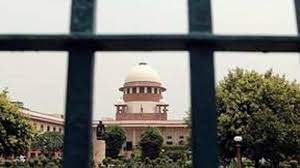The proceedings initiated under the Prevention of Corruption Act, 1988 (hereinafter referred to as ‘Act’) against the respondent herein came to be questioned by him by filing an application for discharge on the ground of investigating officer (hereinafter referred to as ‘IO’) having failed to consider the written explanation offered by him with supporting documents and the conclusion reached by the sanctioning authority was also without considering the same reflecting non-application of mind and thereby the conclusion reached by the sanctioning authority that respondent accused possessed assets disproportionate to his known source of income is erroneous and the charge-sheet material do not reveal any circumstances or evidence to arrive at a conclusion that accused had disproportionate source of income. (Para 1)
The sole question that arises for our consideration is whether the order of the sanctioning authority dated 05.03.2015 is liable to be set aside and consequently, the charge-sheet filed by Anti-Corruption Bureau, Anand Police Station on 17.06.2015 is liable to be quashed? (Para 2)
As already noticed hereinabove the High Court by impugned order allowed the Revision Application by perusing the material on record placed by the respondent -accused and arrived at a conclusion that trial court had committed an error in dismissing the application and accepting the plea of the respondent which was virtually by way of defence and discharged the respondent. (Para 6)
The revisional court cannot sit as an appellate court and start appreciating the evidence by finding out inconsistency in the statement of witnesses and it is not legally permissible. The High Courts ought to be cognizant of the fact that trial court was dealing with an application for discharge. (Para 15)
In the teeth of the above analysis of law when the impugned order of the High Court is perused, it would not detain us for too long to brush aside the contentions raised by the respondent-accused for reasons more than one. Firstly, the charge-sheet has been filed after taking into consideration the written submissions filed by the accused before the Investigating Authority which included the documentary evidences tendered by the respondent accused. Secondly, the statement of friends and acquaintances from whom loans of large amounts had been borrowed by the accused which had been relied upon by the accused to stave off the prosecution in his written submissions filed before the Investigating Authority and which material had persuaded the High Court to accept the same on its evaluation to be true, is nothing but short of accepting the same as defence evidence and examining the truthfulness of its contents even before trial could be commenced or held. Thirdly, the High Court has proceeded to examine the pros and cons of defense by weighing the defence-evidence and probabilities of the conclusion that may ultimately be arrived at, as the basis for exercising the revisional jurisdiction which was impermissible. Fourthly, the purported loans said to have been obtained by the respondent accused from his mother, brother and father are all question of facts which requires adjudication and this could be done only during trial and the explanation relating to borrowing of large sums raises a reasonable suspicion, which has been termed by the Investigating Agency as strong material to file the charge sheet and based on such material the sanctioning authority also recorded its satisfaction under sanction order dated: 05.03.2015 to prosecute the respondent-accused. Hence, raising reasonable suspicion cannot be held or construed at the primary stage for discharging the accused. (Para 16)
The plea or the defence when requiring to be proved during course of trial is itself sufficient for framing the charge. In the instant case, the learned Trial Judge has noticed that explanation provided by the respondent accused pertaining to purchase of shop No.7 of Suman City Complex of plot No.19, Sector-11 from the loan borrowed and paid by the respondent was outside the check period and hence the explanation provided by respondent is a mere eye wash. This is an issue which has to be thrashed out during the course of the trial and at the stage of framing the charge mini trial cannot be held. That apart the explanation offered by the respondent accused with regard to buying of Maruti Wagon-R car, Activa scooter, purchase of house etc., according to the prosecution are all the subject matter of trial or it is in the nature of defence which will have to be evaluated after trial. (Para 17)
In the afore-stated circumstances we are of the considered view that High Court had committed a serious error in interfering with the well-reasoned order passed by the trial court. Hence, the impugned judgment dated 11.01.2018 passed in Criminal Revision Application No.387 of 2016 setting aside the trial court order dated 13.04.2016 requires to be set aside and accordingly it is set aside and appeal is allowed. The trial court shall proceed with the trial having regard to the fact that charge-sheet has been filed in the year 2015 and shall conclude the trial expeditiously and preferably within a period of one year. (Para 18)
SUPREME COURT OF INDIA
2023 STPL(Web) 326 SC
[2023 INSC 894]
State Of Gujarat Vs. Dilipsinh Kishorsinh Rao
Criminal Appeal No. 2504 of 2023-Decided on 9-10-2023
https://stpllaw.in/wp-content/uploads/2023/10/2023-STPLWeb-326-SC.pdf







